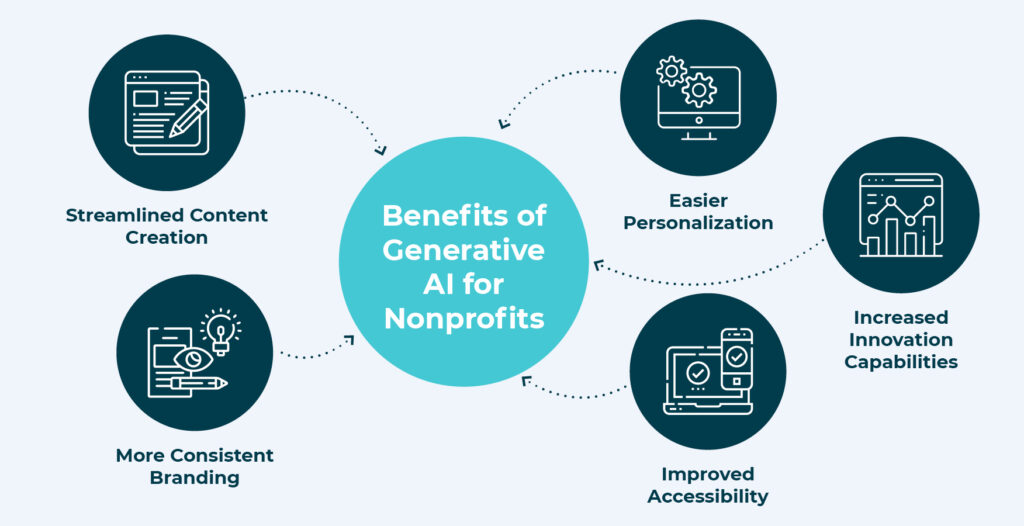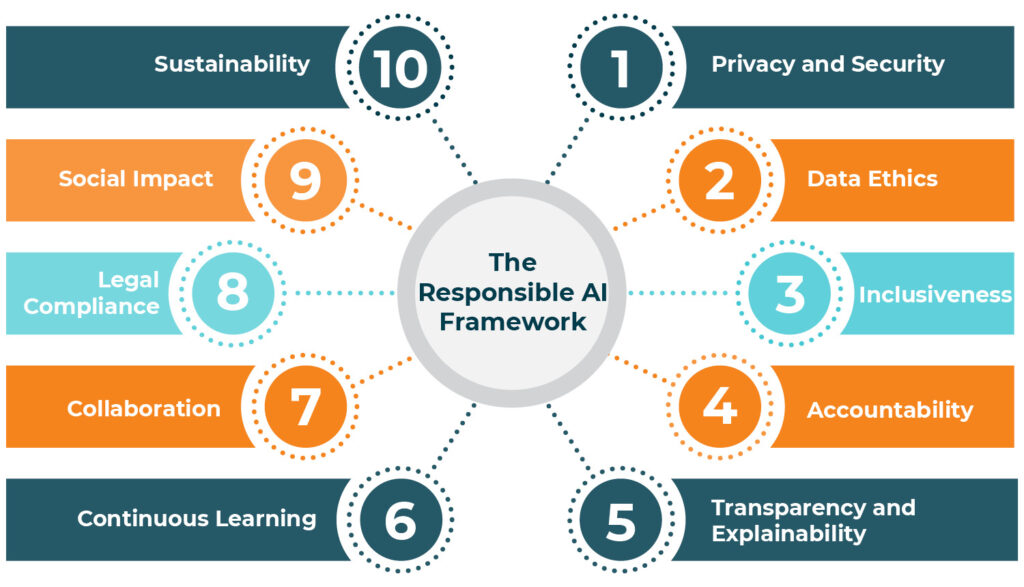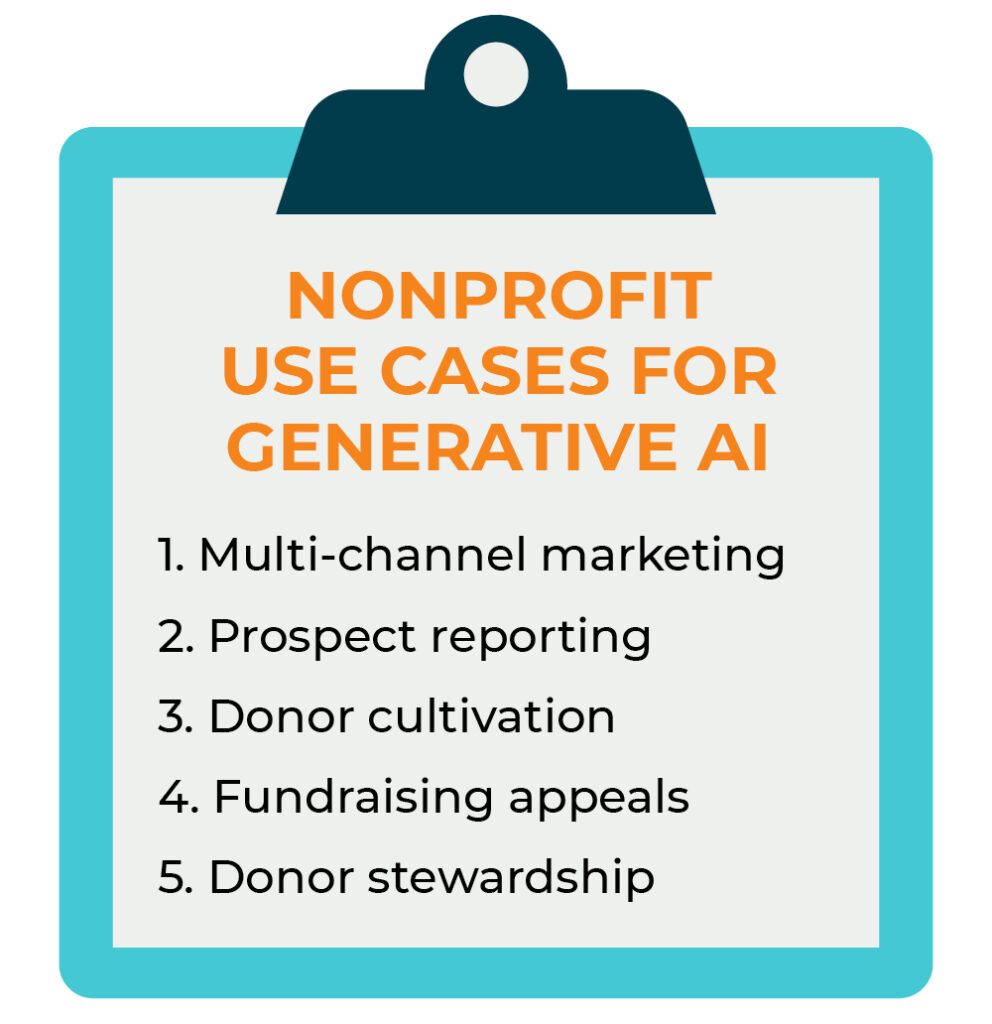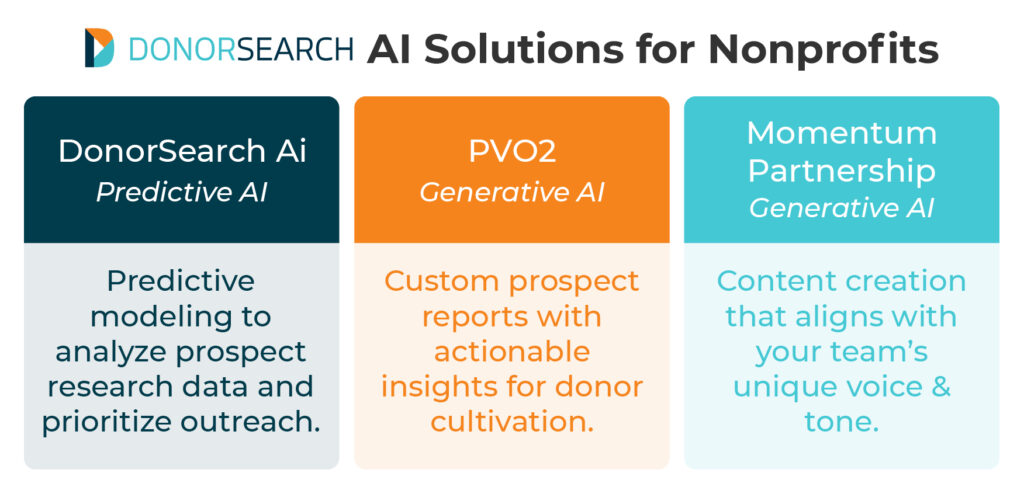
Generative AI Fundraising: What Your Nonprofit Needs to Know
Nonprofits create a large amount of consistency-driven communication to showcase their mission and secure philanthropic support. This includes social media posts, website content, stewardship materials, annual giving appeals, and more. Optimizing both the quality and quantity of these messages requires that you leverage the right tools.
Solutions powered by artificial intelligence (AI) are the most effective way to streamline your nonprofit’s communications. In this guide, you’ll learn all you need to know about how you can leverage generative AI for fundraising and engagement, including:
- Generative AI Fundraising FAQ
- How Nonprofits Can Leverage Generative AI
- A Closer Look at DonorSearch’s Generative AI Fundraising Solutions
If your organization has never leveraged AI for fundraising before, you’re probably wondering what generative AI tools can be used in a nonprofit context and why you should incorporate them into your strategy. Let’s begin by answering a few of the questions you may have.

Generative AI Fundraising FAQ
What is generative AI?
Generally speaking, artificial intelligence is the ability of machines to “think” like humans and process information in a way that allows them to recognize patterns and draw conclusions from the available data.
Generative AI is a specific type of artificial intelligence that uses its pattern recognition and analysis capabilities to develop new, original content like written copy, images, and videos. These tools are typically trained by inputting large amounts of data, which they translate into cohesive and valuable outputs.
Generative AI is often contrasted with predictive AI, which describes solutions that analyze data to project future trends and make suggestions based on those outcomes. Nonprofit AI strategies are most effective when predictive and generative AI are used together.
For example, you could use a predictive AI solution to prioritize a list of major donor prospects you should reach out to based on how likely they are to give within the next year. Then, you can leverage generative AI to help you create a personalized donor journey for each prospect, including email copy, phone call talking points, and other materials to reach out to them and begin the major gift solicitation process.
Why should nonprofits use generative AI?
When leveraged strategically, generative AI can provide your nonprofit with various benefits, such as:

- Streamlined content creation for all of your organization’s donor and prospect outreach and marketing channels, helping you save time and money while driving more results.
- More consistent branding in both visuals and messaging so your mission is recognizable and memorable to audiences.
- Easier personalization of individual communications to make donors feel valued.
- Increased innovation capabilities by exploring new concepts and methods of fundraising and marketing.
- Improved accessibility, since AI can suggest alternative text for digital images, create closed captions for videos, and take other steps to ensure all of your nonprofit’s supporters can engage with your content, including individuals with disabilities.
Make sure to track engagement data, such as email open rates and social media interactions, for the content you create with generative AI to hone your strategy and maximize these benefits for your organization.
What are the top generative AI solutions for nonprofits?
Your organization could incorporate countless generative AI tools into its fundraising work. Some solutions are specifically designed for nonprofits, while others are more general in scope but still useful in a nonprofit context.
Here are a few popular generative AI tools for your organization to consider:
- ChatGPT, Gemini, and Microsoft Copilot. Developed by OpenAI, ChatGPT is probably the best-known generative AI solution available, as it can be prompted to create a variety of text-based content. Bard is Google’s response to ChatGPT, and Microsoft Copilot is the comparable solution that is integrated with Bing.
- DALL-E. This is also an OpenAI solution, but users can prompt it to generate photos, graphics, and other images rather than text.
- Grammarly. Grammarly reviews your writing and provides suggestions to improve elements like mechanics, concision, and word choice.
- Synthesia. This production tool allows you to create professional-looking videos for your organization, complete with AI-generated voiceovers.
- DonorSearch. While we’re already leaders in the predictive AI space with DonorSearch Ai, we’ve added nonprofit-specific generative AI capabilities to our offerings with our new ProspectView Online 2 solution and partnership with Momentum (more on these later!).
No matter which AI solutions you choose, ensure they’re user-friendly, able to integrate with the platforms your nonprofit already leverages, and equipped with all of the functionalities you need to perform the activities you plan to use them for.
How can my nonprofit manage risks associated with generative AI fundraising?
AI is still evolving, and no solution is perfect. As with many new technologies, there are risks that come with using generative AI improperly, such as unintentional discrimination due to biased outputs, a lack of data privacy, and overdependence on technology that takes the essential human touch out of fundraising.
However, the benefits of generative AI fundraising far outweigh the risks as long as your nonprofit commits to using these solutions responsibly. The Fundraising.AI collaborative (of which DonorSearch is a member) has developed a Responsible AI Framework for nonprofits like yours that consists of the following 10 principles:

- Privacy and security, especially regarding sensitive information about donors and beneficiaries
- Data ethics throughout information collection, analysis, and usage
- Inclusiveness by preventing bias and promoting fair representation
- Accountability, or ensuring all results are verifiable and replicable
- Transparency and explainability with community members regarding AI use
- Continuous learning about AI developments and best practices
- Collaboration with other organizations committed to using AI responsibly
- Legal compliance with applicable regulations surrounding AI and data protection
- Social impact—i.e., maximizing the positive and minimizing the negative
- Sustainability and an awareness of how AI fundraising may impact the environment
Additionally, with generative AI in particular, it’s important to collaborate with your AI tools. When a solution creates a piece of content for you, always review it thoroughly and make revisions to ensure it aligns with your audience’s needs and preferences.

How Nonprofits Can Leverage Generative AI
Now that you know what generative AI is and why it’s helpful for fundraising, let’s explore some nonprofit-specific use cases for it. Remember that every organization is unique, so you’ll likely need to adapt these tips to meet your specific needs.

Multi-channel marketing
Leveraging multiple marketing channels creates more touchpoints for your community to learn about your nonprofit’s mission and get involved. Generative AI can help you build out your organization’s multi-channel marketing strategy by:
- Creating email and fundraising letter templates that you can tailor to different supporter segments
- Scheduling regular social media posts and drafting captions for each of them
- Developing copy and graphics for key pages on your nonprofit’s website, such as your About page and donation page
- Outlining blog posts and making suggestions to revise them as you write
- Producing videos in the proper formats to share through any of these channels
Especially if you have limited resources and staff time, generative AI can help your nonprofit develop high-quality content for every channel.
Prospect reporting
A prospect report summarizes key information about a potential donor that your nonprofit can use for moves management. Besides the prospect’s name and contact details, it typically includes the following information:
- Wealth and philanthropic history
- Interests and values that may influence their giving
- Relationships with other individuals connected to your organization, such as existing major donors or board members
- Assessment of engagement likelihood
- Outreach suggestions
After your organization conducts prospect research, you can input the data you find on your prospects into a generative AI tool to create more detailed and actionable prospect reports than you could on your own.
Donor cultivation
Once you’ve made initial contact with a prospect based on their report, your nonprofit’s generative AI tools can also help in cultivating relationships with them. For instance, you could use them to:
- Develop educational materials, data visualizations, and other portfolio elements so prospects can learn more about your organization’s initiatives and impact.
- Draft messages to introduce prospects to other individuals at your organization who are working on projects they may be interested in contributing to.
- Brainstorm lists of ideas for events and activities that allow prospects to engage with your mission firsthand.
Of course, the actual act of building a relationship with a prospect is something only a person can do since it requires emotional engagement. However, generative AI can assist with the behind-the-scenes elements of donor cultivation so you can focus on engaging with donors and prospects with the highest capacity, affinity, and propensity to give.
Fundraising appeals
When the time comes to convert a cultivated prospect into a donor, generative AI can help you develop a donation request that will resonate with your audience. These tools are useful for writing a variety of appeals, including:
- Major gift solicitations
- Annual fund contribution requests
- Year-end giving campaign asks
- Recurring donation program invites
Make sure to prompt your generative AI tools to create each appeal in the correct format. For instance, you might use them to develop a series of emails about annual fund contributions, a direct mail message about your year-end giving campaign, and an outline for a presentation to make your major gift solicitation in a one-on-one meeting with the prospect.
Donor stewardship
As soon as a donor responds positively to a fundraising appeal, it’s time to begin stewarding them. This process involves thanking the donor promptly and in a way that matches the size of their gift, then following up regularly with the goal of retaining their support long-term.
Generative AI can not only help with drafting stewardship messages, but it can also be useful in deciding which methods would be most effective for each donor. For example, handwritten thank-you notes, phone calls, and small gifts are all good recognition strategies for mid-level donors. However, if you can’t decide which one a particular mid-level donor would appreciate most, you can input information about that donor into a generative AI tool (particularly one that integrates with predictive tools) to help you figure out the best idea to make them feel valued.
A Closer Look at DonorSearch’s Generative AI Fundraising Solutions
Here at DonorSearch, we’ve built on our success in providing the leading prospect research database on the market and pioneering responsible AI use in the nonprofit sector with DonorSearch Ai by rolling out two new generative AI fundraising solutions: ProspectView Online 2 (PVO2) and a partnership with Momentum. By adding these to our offerings, we’ve created a complete fundraising ecosystem where you can find, learn about, and reach out to prospects with maximum efficiency and effectiveness.
Let’s dive deeper into each of these AI solutions:

- DonorSearch Ai: As the most advanced machine learning solution for the nonprofit sector, this tool uses customizable predictive modeling to identify and segment your organization’s top prospects. It rates potential donors in six different categories so you know who is most likely to respond to appeals, make a first gift, upgrade their support, and more. (We also have a “lite” version available with more standardized features, Enhanced Core.)
- PVO2: With this updated iteration of our prospect generator tool, you can create custom prospect reports summarizing data from DonorSearch’s prospect research database and providing actionable insights. This way, your team can jump into outreach and cultivation more quickly.
- Momentum Partnership: Through this collaboration, your nonprofit can build a more responsive donor pipeline and pinpoint the optimal time and method for reaching out to each prospect. Then, you can generate messages for cultivation, solicitation, and stewardship that align with your fundraisers’ writing voice and tone to create a personalized, adaptable donor journey for each prospect.
By using these generative AI solutions in conjunction with the predictive modeling capabilities of the existing DonorSearch Ai platform, your nonprofit will be well equipped to take its fundraising efforts into the future. But don’t just take our word for it—check out this video on how The Smith Center for the Performing Arts leveraged DonorSearch Ai to double the size of its monthly giving program:
Final Thoughts
AI is here to stay, in the nonprofit sector and outside of it. Exploring the world of generative AI fundraising now will help your organization stay on top of trends and optimize many aspects of your work. Just make sure to leverage AI responsibly and use tools that allow you to maximize your strategy, such as DonorSearch Ai, Momentum, and PVO2.
For more information on nonprofit fundraising with AI, check out these resources:
- AI for Nonprofits: Everything Your Org Needs to Know. Explore our complete guide to the benefits and uses of AI in the nonprofit sector.
- Fundraising Intelligence: Using AI to Enhance Philanthropy. Dive deeper into the process of using AI for data analysis and predictive modeling at your organization.
- Major Donor Fundraising: How to Strengthen Your Strategy. Learn more about identifying, cultivating, and converting major donors for your mission, including how AI figures into the process.

